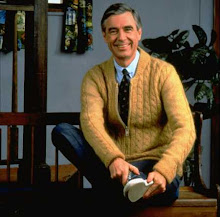In spring 2006, I was staying at the artist’s colony Yaddo, which is on the estate of the 19th-century venture-capitalist and railroad baron Spencer Trask. On the shelf in his wife Katrina's room, I found some prophetic words about our current cultural situation in an old book titled
Our Business Civilization: Some Aspects of American Culture, by James Truslow Adams. I was a little shocked to find such a clear-thinking criticism of the extent to which American society is driven by business concerns there in the study of the wife of a great industrialist! I felt deep sympathy with the writer’s sentiments, and found it remarkable how current the ideas seemed, in spite of the fact that it was published in 1929. Here is a sampling:
“
Overwhelmed by the material advance made in the past five decades or so, and by the vast amount of Pollyanna literature with which we are flooded by politicians and business executives with axes to grind, we are apt to lose sight of the law of compensation and to think of all change as unalloyed improvement.”
“
Change may or may not be “progress” but whether it is nor not it is bound to involve compensatory losses.” p 35
“I
t is obvious that with a national income of even ninety billions, a hundred and twenty million people cannot buy everything. Some things have to go if we are to have new things constantly and pay double or treble for the old.” p48
In a chapter entitled To ‘Be’ and To ‘Do,’Adams quotes Matthew Arnold’s description of culture as “
a harmonious expansion of all the powers which make the beauty and worth of human nature.” He goes on to say: “
This is far removed from giving the degree of Bachelor of Arts to a student who has learned how to truss and dress poultry or has compassed the mysteries of how to sell real estate and run an apartment house. Of course, life is short, and getting rich is long–or may be. Many people who go to college to-day, aside from their lack of desire for education, have no time for it, because it does not lead immediately to ‘power’…”
pp169-170
Adams also cites a foreign critic of American life who says “
one feeling he always had here was that all our goods were in our shop windows and there was nothing behind.” Adams writes in response” “W
e are so busy doing that we have no time to be. …at present what we need above all else in America is education–not the infinitely variegated supply of courses that make a college catalogue look like Sears, Roebucks, but a liberal education that will enable us to create a scale of values for our experiences and to take a philosophical attitude toward the complex reality about us.” …is it not time that we stopped marking down all our spiritual goods to the price that the lowest in the cultural scale can pay?”
We’ve had ample opportunity in the eighty years since those words were written to see many of the other costs of our prosperity: a citizenry disenfranchised and apathetic, our political process reduced to the lowest fear-mongering and the basest manipulation of the electorate, the concentration of power in the hands of large corporations, the privileging of profit above all human values, and the celebration of unchecked greed as the motive force of capitalist democracy. This is not to mention the continuing destruction of the planet upon which we live, and the countless lives destroyed in our wars. These are the real costs of our prosperity.
Our own integrity as humans has been tossed aside as an encumbrance in the race to get more money, more fame, more prestige, more stuff. We have gutted our culture and our civil society and our human relationship to each other in order to get more. Now, we are in the midst of yet another global economic crisis triggered by our own desperate unprincipled grasping and denial. It is not so dissimilar from the one that loomed when James Truslow Adams was writing, and we find that we have forgotten the hard lessons that the great depression taught us.
In spite of the campaign-slogan Hope offered by president-elect Obama, I can’t help thinking it will be hard to undo the damage: we’ve had over thirty years worth of dismantling society in favor of an “every man for himself” business model. In our business civilization, we don’t see fellow citizens and neighbors around us, only competitors to be defeated. But when everyone is driven only by their own hunger, blindly pursuing selfish short-term gain, they end up eating the system that sustains us all. If there is any real hope for us out there, we will have to compost the corporate marketplace nightmare worldview that has been driving our society for a long, long time now, and rebuild our values and our connections to each other based on something other than money and commerce.




